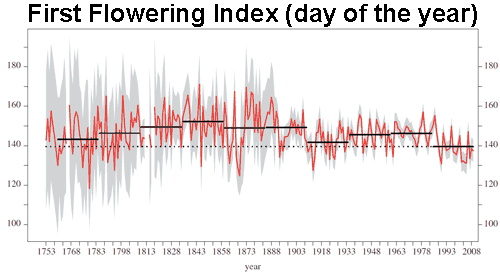How is climate change affecting the advance of spring?
What the science says...
A synthesis of nearly 400,000 first flowering records covering 405 species across the UK found that British plants are flowering earlier now than at any time in the last 250 years.
Climate Myth...
Springs aren't advancing
'While there are numerous studies that indicate that spring has advanced, there is a recent satellite based study that indicates no consistent trends in the start of spring in North America.' (Indur M. Goklany)
Climate change is being recognized as one of the most influential drivers of changes in biodiversity. This is particularly evident in the field of phenology, which looks at how climatic changes affecting timing of events in the natural world. Changes in the timing of one part of the ecosystem can have a ripple effect, disrupting other areas. For example, a change in timing of plant flowering can disrupt the creatures that pollinate them. Similarly, changes in timing of plant or insect behaviour can affect the birds that use them as food supplies. New research has been published stitching together nearly 400,000 first flowering records covering 405 species across the UK (Amano et al 2010). They've found that British plants are flowering earlier now than at any time in the last 250 years.
There's a strong correlation between temperature and the date when flowers first open each year. Consequently, much information can be gleaned from looking at flowering dates in the past. Since the mid-1700s, sightings have been made by full-time biologists and part-time enthusiasts. Systematic recording of flowering times began in the UK in 1875 by the Royal Meteorological Society. However, many sets of records are short-term, fragmented or focus on just one species. Amano 2010 developed a technique for blending fragmented records in a way that takes into account where the records came from, what length of time they cover and the differences between the flowering times of different species. This enabled them to develop a kind of nationwide, year-long, species-wide average.

Figure 1: Average (red line) and 95% uncertainty range (grey area) of the estimated first flowering index index (day of the year). The black
line indicates the average for every 25 years and the dotted line for the most recent 25 years (Amano 2010).
There's been a clear advance in the time of first flowering in recent decades. The average first flowering date has been earlier in the last 25 years than in any other period since 1760. The next step in this research is to see whether the same techniques can be employed on a larger scale, to give a regional or global picture of nature's response to temperature change.
Intermediate rebuttal written by John Cook
Update July 2015:
Here is a related lecture-video from Denial101x - Making Sense of Climate Science Denial
Last updated on 14 July 2015 by pattimer. View Archives































 Arguments
Arguments

































I really agree with this article especially "Climate change is being recognized as one of the most influential drivers of changes in biodiversity". this statement is true this issue now becomes world global issue that we face today.
From this article said that this issue affects the timing of plant flowering can disrupt so this situation happens because of our ecosystem change this issue not just happen with a plant, it also happens with insect so they change their behavior all of this problem comes from the change of temperature in our atmosphere. If we do not fix this problem or find the way to deal with it we will soon face another big problem that we can't imagine.
If we cannot stop this problem how it will affect our Earth?